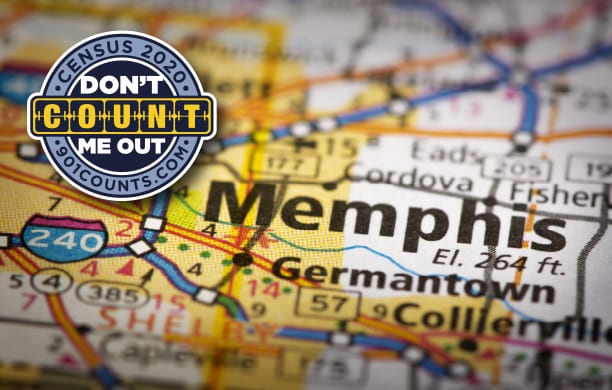by Jennifer L. Sharp —
With a Sept. 30 deadline looming, local officials are making an all-out push to get as many households as possible to complete 2020 Census forms.
The City of Memphis has jumped into the effort big time to make sure communities of color, which traditionally have been undercounted, are accounted for as accurately as possible.
The Census Bureau also is aiding in the effort by having Census takers visit homes that have not yet responded to the 2020 Census.
For a city, whose African-American population is 64.2 percent, according to 2019 U.S. Census estimates, an accurate count is crucial.
That is important for a number of reasons, including the fact that an accurate population count translates into more federal and state resources flowing back into local communities.
Historically, there has been reluctance within the African American and Hispanic communities regarding the Census.
For example, many feel the Census funding will not benefit their communities and will wind up being spent in other areas of the city. Also, many from the Hispanic community are afraid that completing the form will lead to being deported.
With that backdrop, the city created a campaign titled 901 Counts to encourage Shelby County residents to take the Census and to clear up any misconceptions about the 2020 Census.
The initiative was planned and implemented by the Complete Count Committee, a cross-sector group that has made a commitment to “getting out the count” and focusing on traditionally undercounted communities.
The committee is co-chaired by Nidia Logan-Robinson, deputy director of the Memphis and Shelby County Division of Planning and Development, and Allison Fouché, deputy chief communications officer for the City of Memphis.
“Predominately African-American communities are in the top 10 under-counted groups. The COVID-19 pandemic has of course limited in-person, direct outreach,” Logan-Robinson said.
“However, committee members and many other groups are encouraging their employees, and the clients they work with daily, to complete the form online (that includes using your mobile phone), mailing in the form, or responding to a Census Worker at their door.”
Since January, the city and the Complete Count Committee has used several communications strategies, including radio and TV ads, geo-targeted ads in hard-to-count areas, media rounds and public relations, digital and social media campaigns, email blasts, mentions to community and neighborhood associations, and other organizations.
Also being used are texting campaigns and Hispanic outreach with Radio Ambiente and LaPrensa Latina to gain awareness of the 2020 Census.
They have even issued the 2020 Census Community Challenge to encourage underrepresented neighborhoods to take the Census.
“Census data influences the distribution of billions of dollars and we want to ensure that we get our fair share of federal funding,” Fouche said.
“For example, the transportation sector uses Census data to help determine when bus routes need to be changed or added to match up with where people live and work.
“If our community is not fully counted, we can miss out on transportation funding for MATA.”
Mandated by the U.S. Constitution and conducted by the U.S. Census Bureau, the U.S. Census takes place every 10 years and counts the population in the United States and five U.S. territories (Puerto Rico, American Samoa, the Commonwealth of the Northern Mariana Islands and Guam (both in the Pacific Ocean), and the U.S. Virgin Islands).
The data that is collected by the Census provide the basis for distributing more than $675 billion in federal funds annually to communities and determine:
■ How to plan for a variety of resident needs including new roads, schools and emergency services;
■ Population tabulations necessary for legislative redistricting; and
■ The number of seats each state has in the U.S. House of Representatives.
Both Logan-Robinson and Fouché offered valuable final thoughts about why taking the 2020 Census is important.
“The information collected cannot be used against you in any way. It is only for statistical purposes and directly impacts the allocation of millions of dollars to our city,” Logan-Robinson said.
Fouché added, “If we don’t have a complete count, children and families will miss out on many of the resources that they may need.
“Funding for these programs is more critical now than ever due to the COVID-19 pandemic. The Census brings an average of $1,091 per resident per year.
“Multiple that by 10, and that’s a little over $10,000 per resident. We can’t afford to have an undercount.”
To view the self-response rate per Census tract for the 2020 Census, visit https://bit.ly/2EnphTc.
(For more information about the Don’t Count Me Out initiative, visit 901counts.com. For more information about the 2020 Census and to take the Census, visit 2020census.gov.)




